The CHOC Research Institute’s Data Science Team recently hosted its second Pediatric & Lifespan Data Science Conference, along with related hands-on training of high school students and an educational session for CHOC patients and families about the role of artificial intelligence (AI) in pediatric clinical care.
The two-day conference brought together experts in medicine, research and data science from around the world to address the most pressing challenges in pediatric and lifespan research.
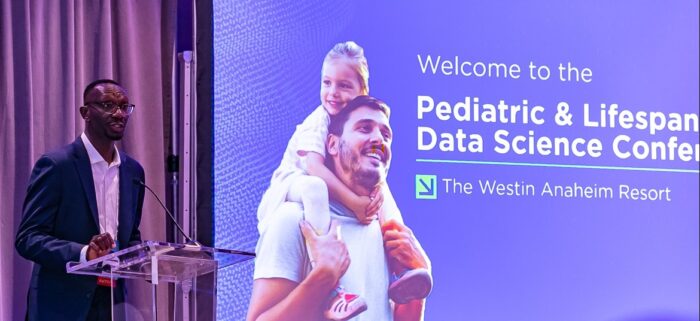
Louis Ehwerhemuepha, PhD, director of research computational and data sciences (computational research) at CHOC, joined Phuong Dao, executive director of the CHOC Research Institute, and Dr. Steven Martel in welcoming participants.
Phuong discussed the five-year history of growth at the Research Institute that included the creation of the Computational Data and Science core, and Dr. Ehwerhemuepha stressed outcomes achieved since the last conference.
Aldo Faisal, PhD, professor of AI in the neuroscience department of bioengineering at Imperial College in London, delivered the keynote address. He discussed, among other topics, AI drivers enabling healthcare systems that include personal health and wellbeing and clinical care, as well as the use of AI in diagnosis, monitoring, and drug development.
Faisal also discussed the collaboration between Imperial College and the Research Data Science team on predicting optimal treatment policies for children with sepsis including planned future works to extend to generalized, multimodal and generative applications.
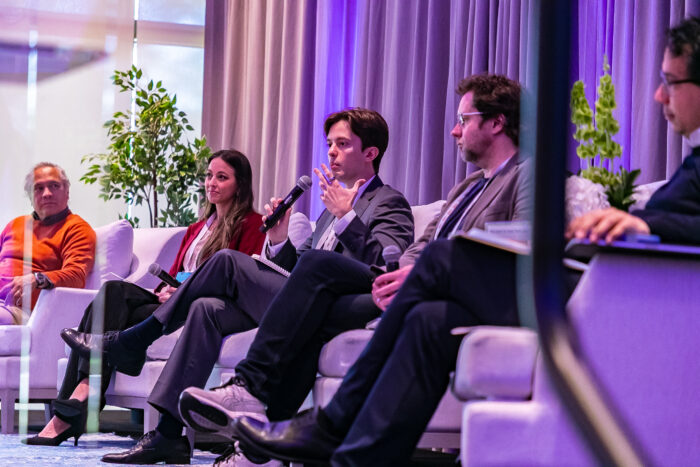
A series of panel discussions also were held on precision medicine, fairness in AI, AI in clinical operations, precision management of psychiatric conditions, the future of AI in medicine, administrative and population health perspectives in AI, and globalization of AI by panelists across several continents.
AI could be used to mitigate risk when it comes to precision medicine, noted Dr. Steven Martel, a pediatric hospitalist with CHOC.
“In the case of an individual, treatment will either work or not work,” Dr. Martel said. “Genomics is an important factor that must be brought into decision-making so that treatment choices have the highest opportunity for success while minimizing the adverse effects. When this information is supplemented with environmental and health behavior data, we gain a broader perspective to evaluate risk for a given patient.”
Families share stories
A panel on “Perspectives from Patients and Families on the Use of Data and Artificial Intelligence for Children with Complex Medical Needs” featured families sharing their experiences with the healthcare system. They discussed the challenges that could be addressed using data and AI, as well as their hopes for the future of medical technology.
The panel of patients and families made two practical suggestions: the development of a tracking tool that informs families where they are in line during rounding and how long it may take for the clinical team to arrive, and a real-time patient experience interactive tool that enables timely feedback and intervention.
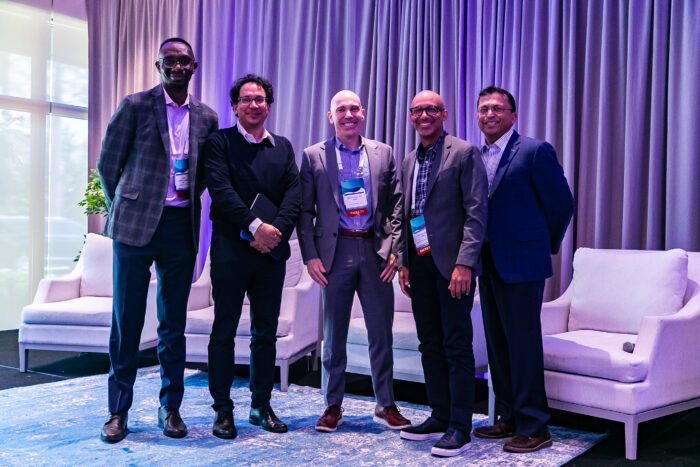
The last panel titled “Conference Insights to Impact: The Path Ahead for Precision Medicine” was moderated by Dr. Sandip Godambe, chief medical officer at CHOC.
It synthesized the conference presentations and discussions, identified the most impactful challenges that can be addressed using AI and precision medicine, and made recommendations for future clinical and community health initiatives.
During the panel, John Henderson, chief information officer of Rady Children’s Health, noted that work is being done in the development of an enterprise data platform to accelerate data science and AI applications and research.
Closing out the two-day conference, Dr. Godambe said advanced technologies have created new ways to treat patients around the world, with solutions from small to large problems.
Data-driven decisions can be used in clinical decision-making when it comes to diagnoses and treatment, and Dr. Godambe expressed the importance of keeping in mind that patients and families remain at the center when it comes to AI to ensure fairness, equity, privacy, security, and transparency during their health journey.
“Innovation happens when like-minded communities come together,” Dr. Godambe noted.
High School, Seacrest Studios, STEAM Explorers and Datathon Events
Prior to the conference, the research data science team, in collaboration with Amazon Web Services (AWS), hosted a community education event on artificial intelligence at the Segerstrom High School.
More than 40 students learned about data science and applications of AI in healthcare building computer vision models to classify pneumonia from chest X-rays. Furthermore, they programmed autonomous race cars using reinforcement learning and competed in an AI-powered race car contest.
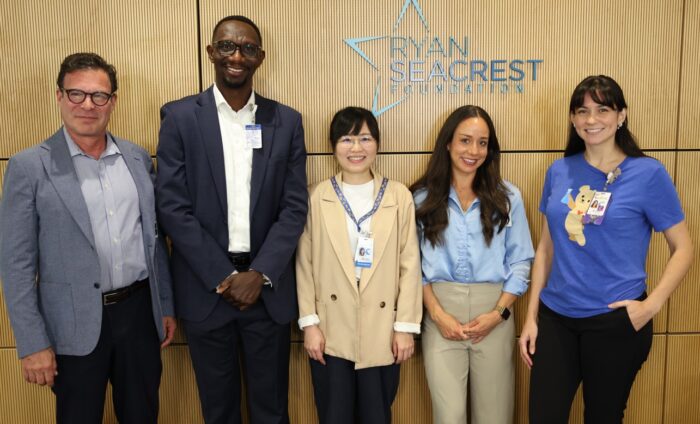
As part of overall community outreach, the research data science team also organized a Seacrest Studios event as part of a STEAM Explorers programming for patients and families on “What is AI and How it Impacts Clinical Care.”
The discussion covered the basics of AI, its applications in daily life, and its potential impact on clinical care, especially in pediatric settings. The STEAM Explorers episodes showcase the science and research conducted at CHOC, with emphasis on STEAM education (science, technology, engineering, arts, math) and collaboration. The event featured interactive Q&A sessions and hands-on activities for patients.
Lastly, during the conference, the research data science team also organized a Datathon during which participants developed healthcare computer vision models for applications in oncology, pathology, gastroenterology, dermatology, hematology, and other specialties.
Team Synthetic Cardiac Data, whose members were Clara Jones, Sarah Eldeen, Salla Kim, Adhithi Lakshmikanthan, Kevin Stachelek, and Brandon Velasquez—emerged as the winners of the Health Datathon Challenge with their groundbreaking approach to predicting cardiac growth in patients with valvular heart disease.
Over the course of the two-day event, the team integrated machine learning models with biophysical simulations and synthetic clinical data to significantly enhance predictive accuracy. They utilized Amazon Web Services tools such as SageMaker and Bedrock to train large language models and mitigate clinical bias.
Their project underscored the importance of selecting artificial intelligence solutions that align with healthcare priorities — balancing cost, speed, and clinical relevance — while also addressing the environmental implications of deploying AI technologies in medicine.
CHOC Chief Scientific Officer Dr. Terence Sanger emphasized that the conference was conceived not merely as an academic forum, but as a catalyst for real-world impact.
He underscored the importance of interdisciplinary collaboration and the strategic application of artificial intelligence to address urgent clinical challenges. In articulating his vision for the future of AI in healthcare, Dr. Sanger advocated for a shift beyond categorical predictions toward a deeper understanding of disease mechanisms and the identification of optimal treatment pathways within a multimodal framework.
Dr. Sanger also highlighted the critical role of cutting-edge translational data science, stressing that sustained progress depends on strong leadership and a cohesive research community united in tackling shared healthcare challenges.
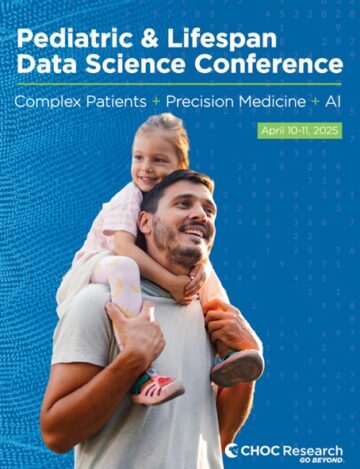
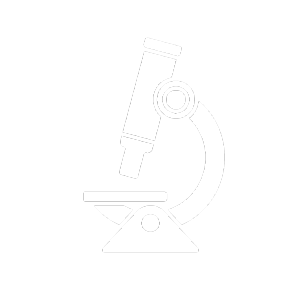
Learn about pediatric research and clinical trials at CHOC




